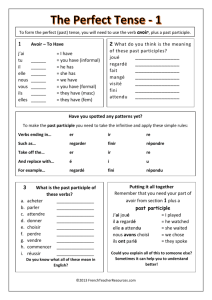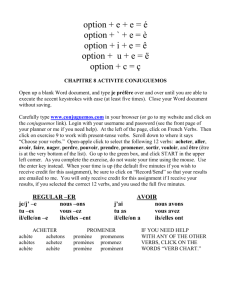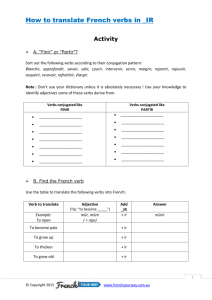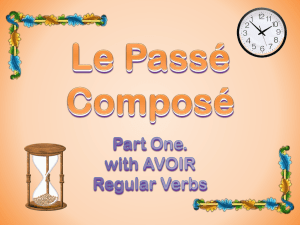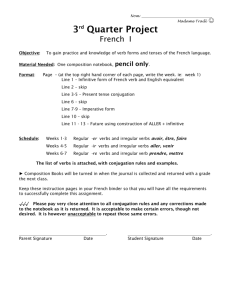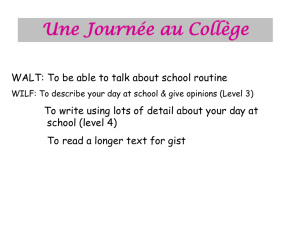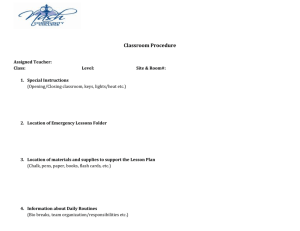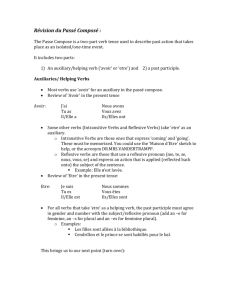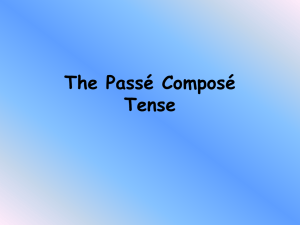The Present Tense
advertisement
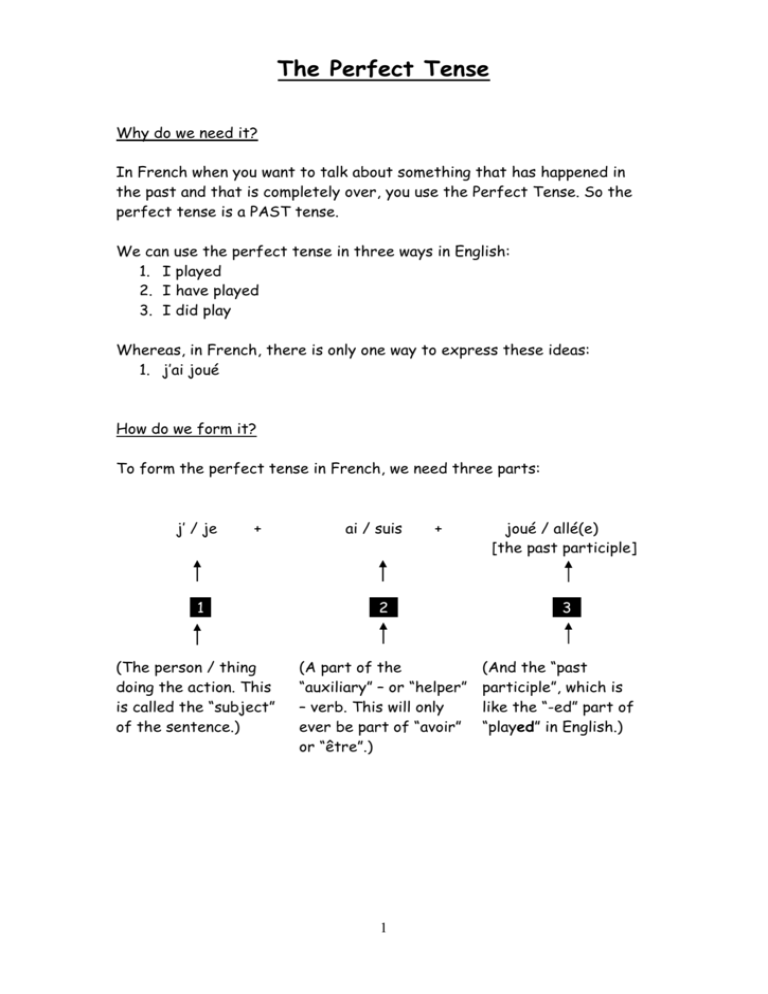
The Perfect Tense Why do we need it? In French when you want to talk about something that has happened in the past and that is completely over, you use the Perfect Tense. So the perfect tense is a PAST tense. We can use the perfect tense in three ways in English: 1. I played 2. I have played 3. I did play Whereas, in French, there is only one way to express these ideas: 1. j’ai joué How do we form it? To form the perfect tense in French, we need three parts: j’ / je + 111 (The person / thing doing the action. This is called the “subject” of the sentence.) ai / suis + 222 (A part of the “auxiliary” – or “helper” – verb. This will only ever be part of “avoir” or “être”.) 1 joué / allé(e) [the past participle] 333 (And the “past participle”, which is like the “-ed” part of “played” in English.) “avoir” and “être” It is very important that we know the verbs “avoir” (to have) and “être” (to be). These are such important verbs in French that you should learn them by heart, just as you learned your times tables in primary school. AVOIR – to J’ai Tu as Il a Elle a On a Nous avons Vous avez Ils ont Elles ont have I have You have He has She has We have We have You have They have They have ETRE – to be Je suis Tu es Il est Elle est On est Nous sommes Vous êtes Ils sont Elles sont I am You are He is She is We are We are You are They are They are Forming the past participle Next, we need to know how to form the past participle. As we know, there are three possible verb endings on infinitive verbs in French – ER/IR/RE. Each of these follows a simple rule. Here is the rule for regular verbs: For ER verbs, remove the ER and add É So “jouer” becomes “ j’ai joué” For IR verbs, remove the IR and add I So “finir” becomes “j’ai fini” For RE verbs, remove the RE and add U So “vendre” becomes “j’ai vendu” 2 Of course, you know enough by now to know that there are lots of irregular verbs in French. These verbs do not follow the normal rules and the most common ones should be learned by heart. But don’t panic! Remember that you can find the past participle of irregular verbs in the verb table in your dictionary if you’re stuck. English to be to have to do/ make to open to offer to laugh to follow to sleep to take to put (on) to write to say to drive to see to read to drink to receive to live to run to believe to know ( a person or a place) to want to have to to be able to to know (a fact) French être avoir faire ouvrir offrir rire suivre dormir prendre mettre écrire dire conduire voir lire boire recevoir vivre courir croire connaître vouloir devoir pouvoir savoir Perfect Tense j’ai été j’ai eu j’ai fait j’ai ouvert j’ai offert j’ai ri j’ai suivi j’ai dormi j’ai pris j’ai mis j’ai dit j’ai écrit j’ai conduit j’ai vu j’ai lu j’ai bu j’ai reçu j’ai vécu j’ai couru j’ai cru j’ai connu j’ai voulu j’ai dû j’ai pu j’ai su Translation I have been / I was I have had / I had I have done / I did I have opened / I opened I have offered / I offered I have laughed / I laughed I have followed / I followed I have slept / I slept I have taken / I took I have put / I put I have said / I said I have written / I wrote I have driven / I drove I have seen / I saw I have read / I read I have drunk / I drank I have received / I received I have lived / I lived I have run / I ran I have believed / I believed I have known / I knew I have wanted / I wanted I have had to / I had to I have been able to / I could I have known / I knew Verbs that take “être” Verbs that take “être” in the past tense are action verbs which show that there is a change of place (movement) or state (transformation) happening. There is a useful acrostic – MRS VAN DER TRAMP – that we can use to help us remember which verbs take “être” in the past tense: MONTER – to go up RESTER – to stay SORTIR – to go out VENIR – to come ARRIVER – to arrive NAÎTRE – to be born DESCENDRE – to go down ENTRER – to enter RENTRER – to go back TOMBER – to fall RETOURNER – to return ALLER – to go MOURIR – to die PARTIR – to leave 3 Past participles with “être” • • • • With être, the past participle often has an extra –e or an –s. If the person is feminine you add an extra –e If there is more than one you add an extra –s If there is more than one and they are feminine add and –es For example: Je suis allé(e) - I went / I have gone Tu est monté(e) – you went up / you have gone up Il est arrivé – he arrived / he has arrived Elle est rentrée – she went back Nous sommes parti(e)s – we left Vous êtes allé(es) – you went Ils sont sortis – they went out Elles sont restées – they stayed Letters are in brackets because they might be feminine or might be plural – depends on the individual case. A checklist for forming the perfect tense with “être” 1. 2. 3. 4. Check if the verb is a Mr Van Der Tramp… Use the verb être Add the past participle Make sure that the past participle agrees. e.g. “I went” ALLER Mrs Van Der Tramp? Je suis Used correct part of être? Je suis allé Added past participle? Je suis allée Agreed past participle? 4 Exercises to check your comprehension The past participle with “avoir” Find the past participle of these regular verbs: 1. 2. 3. 4. 5. 6. 7. 8. 9. manger (to eat) jouer (toplay) vendre (to sell) dormer (to sleep) finir (to finish) parler (to speak) chanter (to sing) grandir (to grow up) Now use these past participles to help you translate these sentences: 1. 2. 3. 4. 5. 6. 7. 8. I have eaten a pizza. You have played football. He sold the cat. We have slept in Paris. They (m) have finished the sandwich. They (f) spoke French. She has sung. You grew up. The past participle with “être” Translate these sentences into French, and use the Mrs Van Der Tramp checklist to make sure you follow all the steps! 1. 2. 3. 4. 5. 6. 7. 8. I went to Paris. You went back home. (chez toi) He went down to the kitchen. (à la cuisine) She left. We fell. You went out with your friends. (vos amis) They (m) entered the house. (dans la maison) They (f) stayed in town. (en ville) 5 More exercises A. Choisis la bonne réponse.: 1 Elle ____ mangé .( a/ ai / ont) 2- Elles _____ visité. ( ai / avez / ont) 3- Nous ______ bu. ( ont / avons / ai) 4- IL _____ acheté. ( a / ai / ont) 5- J'____ pris ( avez / a / ai) 6- Tu ____ vu ( a / ai / as) 7- Vous ______ fait ( avez / ont /avons ) 8- Ils ______ regardé ( ont/ avez / a) B. Complète les phrases. Elle a bu J' ai mangé Nous avons pris Vous avez choisi Il a vendu Nous avons fait l'avion sa voiture une limonade les magasins une pizza la solution facile C. Traduis les expressions suivantes en anglais.(utilise ton dictionnaire) Hier: ______________ Avant-hier: ______________________ La semaine dernière: _________________ Le week-end dernier: ________________ D. Ecris le bon pronom.( je, tu , il etc…) 123456- _____ a visité Londres. _____ avons mangé un sandwich. _____' ai vu la Tour de Londres. ______ avez écouté de la musique. ______ ont joué au foot. ______ as pris un taxi. 6 E. Traduis les phrases suivantes en anglais 12345678- J'ai bu de la limonade. Elle a acheté des baskets. Nous avons écouté une cassette. Tu as vu la Tour Eiffel? Ils ont joué au tennis. Il a visité Madrid. Elles ont fait les magasins. Vous avez mangé à l'hotel. F. Complète la lettre Paris, le 12 octobre 2001 Use these words to help if you need them : Chére Charlotte, Je suis à __________. Hier, j'ai __________ le musée du Louvre. Il faisait chaud, alors, j'____ acheté une _______. J'ai _____ la Tour Eiffel, c'était super. Puis, j'ai _____ les magasins. Le soir, avec mes ___________, nous avons ____________ dans un restaurant très chic. _______________ Marc Au revoir parents ai Paris vu fait acheté visité glace mangé 7 G. Write the correct form of the verb in the perfect tense and translate into English Example : je (gagner) je (finir) j’ai gagné = I won; I have won j'ai fini = I finished; I have finished nous (attendre) nous avons attendu = we waited; we have waited 1. 2. 3. 4. 5. 6. 7. 8. 9. 10. 11. 12. 13. 14. 15. 16. 17. 18. 19. 20. 21. 22. 23. 24. 25. 26. 27. 28. 29. 30. 31. 32. 33. 34. 35. 36. 37. 38. 39. 40. nous (gagner) vous (gagner) ils (tirer) je (tirer) je (demander) je (danser) tu (penser) je (détester) il (montrer) elle (montrer) vous (toucher) je (cacher) j’(expliquer) elles (expliquer) on (expliquer) j’(oublier) vous (deviner) il (traverser) nous (discuter) je (marcher) tu (finir) on (finir) ils (choisir) il (choisir) je (attendre) nous (vendre) vous (attendre) elle (vendre) je (quitter) je (manger) elle (trouver) nous (donner) tu (fermer) je (raconter) nous (garder) tu (habiter) nous (habiter) je (trouver) nous (marcher) on (parler) nous avons ...... 8 THE PERFECT TENSE REGULAR “-RE” VERBS Remember that in French, the Perfect Tense is made up of two things: 1. a helping verb (a bit of avoir) 2. a past participle Reminder of AVOIR: j’ai tu as il a elle a on a nous avons vous avez ils ont elles ont To make the past participle of regular RE verbs : 1. take off the RE 2. add u (e.g. vendre changes to vendu) Exercise A: Write down the past participle and English meaning of the following verbs. 1. 2. 3. 4. 5. vendre attendre défendre battre romper (to sell) (to wait) (to defend) (to beat) (to break) PAST PARTICIPLE MEANING ______________ ______________ ______________ ______________ ______________ (______________) (______________) (______________) (______________) (______________) Exercise B: Now write these sentences in the present tense, using the correct RE verb. Remember you need 2 things : (abit of AVOIR, and a PAST PARTICIPLE) 1. Mon frère ____ _____ son vélo. 2. Marseilles _____ _____ Paris St Germain. 3. J’ _____ ______ mon nouveau portable. 4. Elle ____ ____ son droit de voter. 5. Nous _____ ______ le bus. 6. Est-ce que tu _____ ______ la voiture? 7. On ____ _____ le début du concert. 8. Ma mere _____ ______ les oeufs. 9 (My brother sold his bike) (Marseilles beat Paris St Germain) (I broke my new phone) (She defended her right to vote) (We waited for the bus) (Have you sold the car?) (We waited for the start of the concert) (My mother beat the eggs) Exercise C: Now change the first five sentences into negatives using “not” (ne…pas), then write the English meaning of the new sentences beside them. (Remember – the negative goes ROUND the bit of AVOIR). 10
